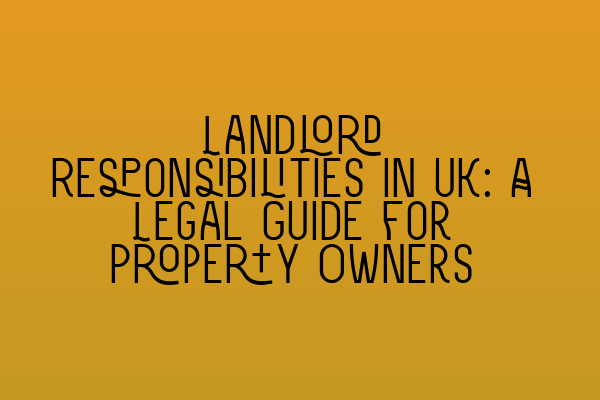Title: Landlord Responsibilities in UK: A Legal Guide for Property Owners
Introduction:
As a property owner in the UK, it is crucial to understand your landlord responsibilities thoroughly. This comprehensive legal guide will enlighten you on the key obligations you have as a landlord, ensuring you maintain compliance with the law and foster positive landlord-tenant relationships. Whether you are a seasoned property owner or a first-time landlord, this guide will provide you with valuable insights and essential information. Read on to discover your responsibilities and obligations as a landlord in the UK.
1. Provide a Safe and Habitable Property:
Ensuring the safety and habitability of your rental property is of utmost importance. It is your legal obligation to maintain the property in a safe condition, free from hazards that may cause harm to your tenants. This includes essential services such as water, gas, and electricity. By regularly inspecting and addressing maintenance issues promptly, you can fulfill this responsibility and provide a comfortable living environment for your tenants.
2. Comply with Health and Safety Regulations:
Adhering to health and safety regulations is crucial to protect the well-being of your tenants. You must meet the required standards for gas and electrical safety, fire safety, and general structural integrity. Regular inspections, obtaining necessary safety certificates, and keeping up with maintenance are essential components of fulfilling your health and safety obligations.
3. Protect Tenant Deposits:
Under the Tenancy Deposit Protection Scheme, you are legally required to protect your tenant’s deposit in a government-approved scheme. This ensures that the deposit is safeguarded and returned to the tenant at the end of the tenancy, provided there is no damage beyond normal wear and tear. Familiarize yourself with the specific regulations relating to deposit protection, as non-compliance can lead to legal consequences.
4. Provide Proper Documentation and Tenancy Agreements:
It is essential to provide your tenants with a written tenancy agreement that outlines the rights and responsibilities of both parties. A well-drafted agreement can help prevent misunderstandings and disputes. When creating a tenancy agreement, consider seeking legal advice to ensure it complies with current legislation and protects your interests as a landlord.
5. Ensure Proper Maintenance and Repairs:
Keeping your rental property in good repair is not only a responsibility but also a legal requirement. Regular maintenance and addressing repair issues promptly can help avoid more significant problems in the future. Make sure you have a system in place to address maintenance requests from your tenants promptly.
6. Respect Tenant Privacy:
Respecting the privacy of your tenants is crucial. While you have the right to enter the property for inspections or repairs with proper notice, you must provide reasonable notice and obtain consent from your tenants. Failure to respect tenant privacy can lead to strained relationships and potential legal issues.
7. Abide by Anti-Discrimination Laws:
Under the Equality Act 2010, it is illegal to discriminate against tenants based on protected characteristics such as gender, race, religion, disability, or sexual orientation. Ensure you follow fair and non-discriminatory practices during the tenant selection process and throughout the tenancy.
8. Understand Eviction Procedures:
While eviction is a last resort, it is vital to understand the legal eviction procedures in the event of tenants breaching the tenancy agreement or failing to pay rent. Familiarize yourself with the eviction laws and processes specific to your jurisdiction to protect your rights as a landlord while respecting the rights of your tenants.
Conclusion:
Being a responsible landlord entails fulfilling numerous legal obligations and maintaining positive relationships with your tenants. By familiarizing yourself with the responsibilities outlined in this guide, you can navigate the UK’s landlord-tenant legal landscape with confidence. Remember to stay updated on any changes in legislation and seek professional legal advice when needed. By fulfilling your duties as a landlord, you can cultivate a harmonious tenancy and maximize the value of your property investment.
Related Articles:
Understanding Contractual Capacity: Rights and Limitations
Interactive SQE Mock Tests for Contract Law: Test Your Knowledge
Join Our SQE Contract Law Webinars: Expert Insights and Guidance
Contract Law Reforms: An Analysis of Recent Changes
Parties in a Contract: Rights and Responsibilities
